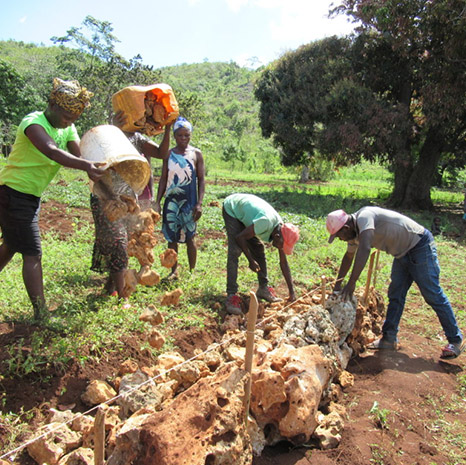Stories of Change

Families in Mole St Nicolas, Haiti, working on a soil conservation program.
Baseline studies set foundation for measuring success
This story comes from our partners at Growing Hope Globally. It is about a CWS program in Haiti. It is reposted with permission from its original posting here.
Most of the stories that we share at Growing Hope Globally highlight the successes and progress made by the communities we support. However, you might be wondering what things are like before our partners start a new program.
Many of the programs we fund utilize baseline studies. They are typically conducted by program staff in the first few months of the program. Information is gathered by interviewing participants and making observations regarding things like housing quality or whether or not the family has livestock or gardens. As staff meet with each participant family they begin building trust, which is key to the long-term success of the program. They also get a sense of the challenges or barriers that must be overcome for the community to flourish, as well as the resources or skills that already exist in the community and might be leveraged.
A recent baseline study conducted for programs in the Northwest Department of Haiti provides some perspective. The Haiti Mole St Nicolas and Haiti Jean Rabel program staff conducted 600 interviews to gain insights into the communities where they work. They found:
– Families range in size from single individuals to ten members. The average was six people per household.
– About 30 families shared that they have children who are not living in their homes because they cannot afford to care for them. The children are either living with relatives or working as domestic servants. Unfortunately, many children that serve as domestic servants in Haiti suffer from physical and emotional abuse.
– The average family has access to three acres for farming and livestock. Primary crops are corn, black beans, and lima beans. Many families also farm plantains or yucca.
– 98% of program families are not familiar with composting, erosion control, or other soil conservation practices. 86% of families use slash and burn practices to prepare their fields.
– 80% of families do not use or have access to any type of fertilizer for their crops.
– Average income is 44 US Dollars per year. People that work as fishermen make considerably more, but also have more expenses.
– About half of the families do not have access to a clean water source and about 35% of families have suffered from diarrhea or typhoid in the last year as a result.
– 98% of families reported entire days where they had nothing to eat in the last year.
The baseline survey shows that participating families currently face high levels of food insecurity. While these initial statistics may be discouraging, this information will allow us to see the progress being made as the program is implemented. The results of the survey will be shared with the communities to encourage community reflection and can be used as a tool for advocacy. It will also allow staff to monitor the impact being made and adjust the program as needed to ensure that the funds contributed are making the intended positive impact.
